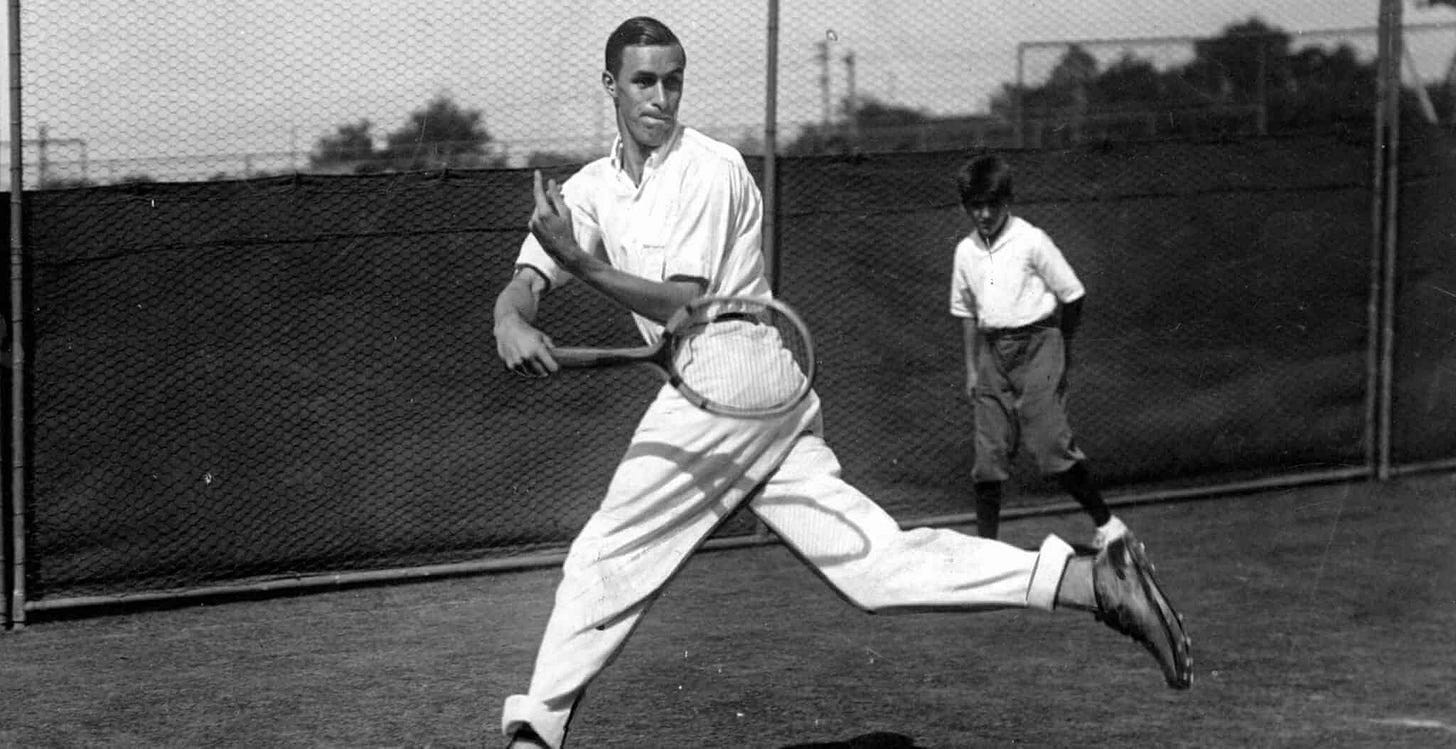Max Woosnam: The Greatest British Sportsman You've Never Heard Of
Olympic Gold, Wimbledon Champion, England Football Captain, Lord’s Cricket Century, Scratch Golfer, 147 Snooker Break - Woosnam Could Do It All
Forgotten greatness in plain sight
It is hard to fathom how a man like Max Woosnam has fallen so far from public memory. Born in Liverpool in 1892, his athletic record reads like fiction, yet almost no one speaks his name today. In an age when sporting heroes are built around social media profiles and marketability, Woosnam remains a ghost, although one with achievements so vast they seem implausible. He should be a household name in Britain and a celebrated son of Liverpool. Instead, he is buried under decades of silence.
This blog, prompted by a reader’s comment on my recent piece about Wimbledon’s origins, aims to set that right.
Life across every pitch, court and battlefield
Woosnam was a product of the public school system at its most privileged and punishing. Educated at Winchester College and later Trinity College, Cambridge, he played everything, and not casually. Cricket, golf, football, lawn tennis, squash, real tennis, billiards, snooker and table tennis, he not only competed but dominated.
As a schoolboy, he scored a century at Lord’s. At university, he gained Blues in football, cricket, golf and lawn tennis, a record that might still be unmatched. He captained Cambridge’s football team and, while still a student, signed with Manchester City. That alone would have justified admiration. Yet for Woosnam, it was only one line on an extraordinary sporting CV.
His footballing prime came at a time when the divide between amateur and professional was still fiercely protected. Despite being an amateur, he captained Manchester City, played nearly 100 matches, and earned a call-up to the England national team, again as captain. This was no ceremonial appointment. He led with poise and composure, often described as a natural leader on and off the pitch.
In parallel, his tennis career placed him among the elite. At the 1920 Summer Olympics in Antwerp, he won gold in men’s doubles and silver in mixed doubles. The following year, he triumphed at Wimbledon in the men’s doubles with Randolph Lycett. He later captained the British Davis Cup team, which further cemented his place in tennis history.
Still he wasn’t finished. His golf handicap was scratch, his billiards game strong enough to record a perfect 147 break in snooker, and legend has it he once beat Charlie Chaplin at table tennis using only a butter knife. If that sounds too far-fetched, it sits comfortably alongside everything else he did with understated brilliance.
War hero, amateur icon and quiet professional
Between sporting triumphs, Woosnam served in the First World War. He fought at Gallipoli and on the Western Front. His time in the trenches included service alongside the poet Siegfried Sassoon. Many came back from the war changed or broken. Woosnam returned and picked up his racquets, golf clubs and football boots as though the horrors of war were only a pause.
What makes his story more remarkable is how little interest he had in celebrity or status. He rejected the idea of turning professional, seeing sport as a matter of honour, not income. After retiring from competition, he joined ICI and later sat on the company’s board. He smoked heavily, avoided publicity and died in London in 1965.
His attitude reflected a sporting philosophy that now feels lost. Play the game well, win with grace, and let the results speak. He would turn up to matches in a suit, complete with a pocket handkerchief. He was one of the last of a generation who believed that excellence required no amplification.
Liverpool should remember Max Woosnam
For someone born in Liverpool and shaped by Britain’s most elite institutions, Woosnam’s obscurity is as baffling as it is unjust. You could argue that his achievements span so many regions that no one city can claim him. Manchester, Cambridge and London all played a role in his success. But Liverpool was his beginning, and beginnings matter.
Liverpool has a proud sporting heritage. Football, boxing, horse racing and golf all have deep roots in the city. But Max Woosnam’s blend of talent, humility and versatility puts him in a category of one. This was not a man who excelled in two or three disciplines. He reached the highest level in more than five. He won Olympic gold, lifted trophies at Wimbledon, captained Manchester City and England, and still found time to make a 147 break in snooker.
In today’s sporting climate, the idea of a multi-sport athlete at that level seems impossible. Those who manage to cross codes do so with great effort and rarely reach the top in more than one. Woosnam did it again and again, often while holding down a full-time job. There is no comparison, only admiration.
Which is why it matters that more people know who he was. History only survives if we keep it alive. At the very least, Liverpool should honour him with a statue, a plaque or a public display. Recognition is not about ego, it is about truth. And the truth is, Britain has never seen another sportsman like him.
The man who did everything, quietly
There is something deeply British about Max Woosnam’s career. Not just in the sports he played or the places he studied, but in the way he achieved greatness without ever needing to shout about it. He won, he led and he inspired. Then he went home, went to work and carried on with life. He never sought the spotlight, and maybe that is why it never followed him.
But it should now. His story deserves to be told, shared and celebrated. Not just for what he won, but for the way he lived. In an era obsessed with stardom, Max Woosnam remains a reminder that true greatness does not need a stage.


